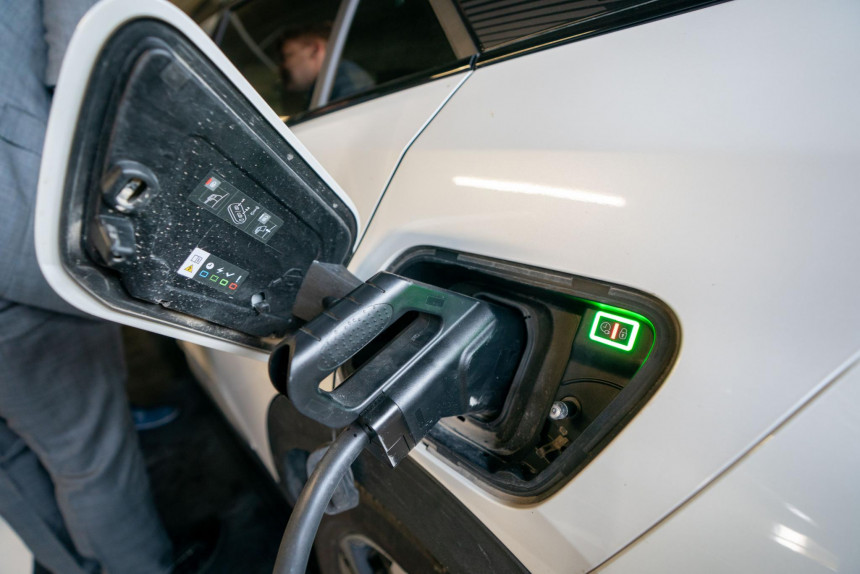Latvia could become the EU's car graveyard

In April, the first electric car subsidized by the state found its owner. The Ministry of Environmental Protection and Regional Development has found €10 million for this program, which would co-finance the purchase of around 2000 cars. So far, the program has not been very popular, but EU Member States have already agreed that in the not too distant future, only electric cars will be available for new purchase. Politicians believe that such a decision would mean a rapid ageing of the Latvian car fleet.
European Union environment ministers agreed on Wednesday morning to end the sale of new cars with internal combustion engines in the EU by 2035. The decision was taken to reduce carbon dioxide emissions to zero. This means that from 2035 the EU will effectively stop selling new petrol and diesel cars and switch completely to electric cars.
The environment ministers' agreement still needs to be discussed with MEPs to reach a final compromise, but it is already clear to our MPs that, for Latvia at least, this decision is premature and could mean that Latvia's fleet will rapidly age while becoming more dangerous and environmentally unfriendly.
Green patriotism without understanding
Kārlis Šadurskis, who represents New Unity (Jaunā vienotība) in the Saeima Economic, Agricultural, Environmental and Regional Policy Committee and who has also worked in the European Parliament's Environment Committee, points out that the key to the effectiveness of the EU environment ministers' agreement lies in the mechanism for subsidizing new cars. "Without adequate additional measures, the Latvian car fleet will become on average one year older every year," says Šadurskis.
The success of the plan will also be determined by technological progress over the next 12 years, he said. "There is one problem with electric cars: the battery has a shorter lifetime than the chassis and bodywork, but if the battery is replaced, which is half the price of the car, the chassis and bodywork expire before the second battery and owners are faced with a serious dilemma - to buy a new car or a new battery," says the MP, who also recalls the negative environmental impact of electricity production and extraction of rare earth metals needed for batteries.
The politician acknowledges that environmental issues in Europe are often taken up without thinking more broadly.
"I have seen a bit of green patriotism. When they talked about reducing emissions to 40%, it reached the point of auctioning. Sometimes it gets to strange things at the political level (...), when I worked in the Environment Committee, some colleagues there did not stand out for their understanding of energy processes, but they were very green,"
says Šadurskis.
Empty statements?
For his part, Jānis Urbanovičs, representing Harmony (Saskaņa) on the responsible committee, believes that the decision on electric cars could be reconsidered in the next 12 years. "This decision should not be taken at face value. This is yet another green energy regurgitation. Science has still not produced convenient, safe and cheap batteries for electric motors, disposal is still expensive, charging stations are still expensive. Already, everything is as expensive for gas-powered buses as it is for diesel ones, electricity prices are not standing still either, and it may be that diesel will be the cheapest and most environmentally friendly thing to put in the fuel tank. Just as burning coal and peat has become green and environmentally friendly," says Urbanovičs, referring to Germany, which has resumed coal-fired electricity generation as a result of the energy crisis caused by the Russian war in Ukraine.
Ralfs Nemiro, former Minister of the Economics and Vice-Chairman of the Saeima's responsible committee, believes that Europe, along with Latvia, is making hasty decisions that are not based on any calculations. The MP believes that only the richest countries in the EU, such as Germany, are capable of abandoning internal combustion engines in the new car market. Nemiro also doubts that in the next 12 years there will be such a rapid development of technology to solve all the problems currently associated with electric cars.
"At the moment it is at the level of policy documents and statements. It looks nice enough, but I would like to see studies on whether it is even feasible,"
says the former Minister of the Economics.
Romāns Naudiņš, an independent but pro-government MP serving on the committee, has no doubts about technological progress. "2035 is very far away. If we look at how technology has developed in the last 12 years, for the same phones, for electric cars, I can predict with absolute certainty that, in addition to electric cars, some alternative to the internal combustion engine will be developed. So I'm not worried, the market and demand will put everything in place," says Naudiņš optimistically.